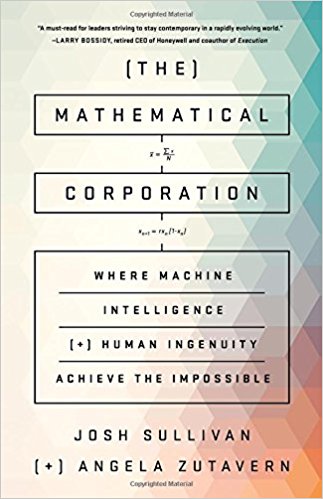Background
I heard about The Mathematical Corporation: Where Machine Intelligence and Human … by Josh Sullivan and Angela Zutavern through a tweet by Kirk Bourne.
I conduct a course at Oxford University on Data Science for IoT. I have also recently launched a course on AI for fintech. The Mathematical Corporation covers many issues that I have encountered in my teaching and consulting.
About the book
In essence, Mathematical Corporation calls for new leadership traits in the world of AI.
The book postulates a world where Leaders will develop new thinking skills for working with machines.
Leaders will address Big, unknown questions by querying the universe of data.
They will aspire to work towards breakthrough or impossible strategies
Leaders embrace complexity (“Complexity is the new treasure”, “Complexity is a boon not a burden”)
Leaders will prefer complex models which solve Big problems over over-simplified models which could lose the essence. (The word ‘impossible’ features many times in the book – ex impossible problems)
The most significant statement for me was “Scientific leaders do not excel because of what they know but rather because of how much they inquire about what they don’t know”
The book proposes that Business leaders adopt a similar mindset – for example every investigation could begin with a literature review
My impressions ..
Based on my experience, I very much agree to the ideas in the book
For example: I recently heard about a start-up who wanted to deploy complex AI models – but did not have any Data (on which to train their Deep Learning models)
This happens more often than you think!
AI is a buzzword – but technology behind AI has a lot of potential.
To exploit the true potential of AI, we need leaders to think about solving complex / impossible problems and adopt new ways of thinking
Like all good books, The Mathematical Corporation makes you think and raises questions
For example:
- Will corporations address complex problems which may not agree with the short term / quarterly focus?
- Will leaders choose a narrow tech focus and solve incremental problems (v.s. complex ones)?
- Will existing leaders adapt or should we wait for a new set of leaders?
Time will tell ..
The book link is The Mathematical Corporation: Where Machine Intelligence and Human … by Josh Sullivan and Angela Zutavern

